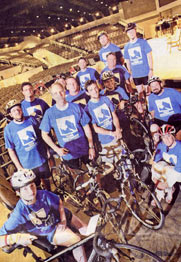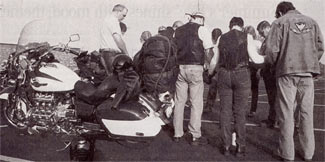Big churches finding ways to grow smaller 
Groups for people with like interests help keep
flock together, pastors say
Sunday, June 05, 2005
GREG GARRISON
News staff writer
Last Sunday, motorcyclists from Mountaintop Community Church
attended the morning service, then revved their
Harley-Davidson motorcycles for a ride around the city.
Another group in the church took part in a triathlon
together last weekend.
"It just helps break down a big church with a common
interest," said Curt Riess, who leads the motorcycle
group with his wife, Devan. "You get to know those
people."
With the proliferation of megachurches - more than a
dozen churches in Birmingham now fit that definition,
drawing thousands in weekly attendance - it's easy for
churchgoers to feel like strangers in the crowd on Sunday
morning.
"A lot of people feel overwhelmed and lost," Riess
said. "This breaks it into 10 or 15 people you can get
to know very well."
Worshippers appreciate the services that megachurches are
able to provide, such as daycare and elaborate music
programs, but sometimes it's a challenge for members to feel
like part of a community.
That's why megachurches have been striving to create a sense
of intimacy with small groups based on shared interests,
said the Rev. Bill Elder, pastor of Mountaintop Community
Church, which has weekly attendance of 1,500 at its Vestavia
Parkway building.
"Once you get beyond 300 people, you can't know
everyone," Elder said.
It can be a Bible study or a motorcycle club, just something
to break a big church down into small pieces.
"The church has got to grow larger and smaller at the
same time," said the Rev. Chris Hodges, pastor of
Church of the Highlands, which began meeting in a home in
2001 but now draws 3,500 to its Sunday worship services at
Mountain Brook High School.
In one of its 230 specialized classes, a group called
Israel 101, 11 people went to Israel together, spending
about $2,120 each for a tour that included the Dead Sea and
Jerusalem.
Friendships
"It's an intimate atmosphere where you're building
friendships and relationships," said Taylor Innes, who
went to Israel, attended another class on ministry training,
and also teaches a "Bloom Where You are Planted"
class for women.
"They hold you accountable and encourage
you," said Innes.
Whatever people like to do, there's probably a group to
join, she said.
"Some people meet just to go run," Innes said.
"They pray and then they run."
At Sixth Avenue Baptist Church, where Sunday worship draws
2,500, a married couples ministry takes trips together. This
week, they leave for a Hawaiian cruise.
It's a necessary twist on the megachurch experience, pastors
say.
"It's vital they have some smaller community
experience," Elder said. "We call them Nexus
groups." 
Mountaintop publishes a directory of Nexus groups that
include support groups, fly-fishers, Harley riders, bridge
players and mountain bikers.
"Whatever interest they have, we want to use that
for people to enter the group experience," Elder said.
"If people don't have community, they're going to drop
into a very inactive status quickly."
At Gardendale's First Baptist Church, where attendance runs
3,200 every Sunday, there are 150 Sunday school classes that
become the care groups, said the pastor, the Rev. Steve
Gaines.
"That's where the people receive individual
ministry," Gaines said. "If they just come to the
worship service, they won't meet a lot of people and develop
lasting relationships."
Many megachurches have developed the non-Bible study
focus of small groups to attract and keep non-churchgoers,
Mountaintop's Elder said.
"All the groups will have a spiritual focus each time
they gather," he said. "We train the leaders. Some
people won't drop out after 10 years. I'm interested in
reaching unchurched people through the interests of
people."
Many churches that are not growing have turned inward and
not kept their evangelistic edge, Elder said. "It's
very comfortable and they don't have to mess with
change," he said. "If a church is not adapting,
it's not going to continue to grow."
Elder grew up in a 100-member Presbyterian church. "You
do know everybody," he said. "That's a nice thing.
People will ask questions about how you're doing. That kind
of intimacy is a neat thing. But you can make it into an
idol and that will not build God's kingdom."
"We really do experience community, even though we
don't know everybody," Elder said.
E-mail: ggarrison@bhamnews.com |
|
|
